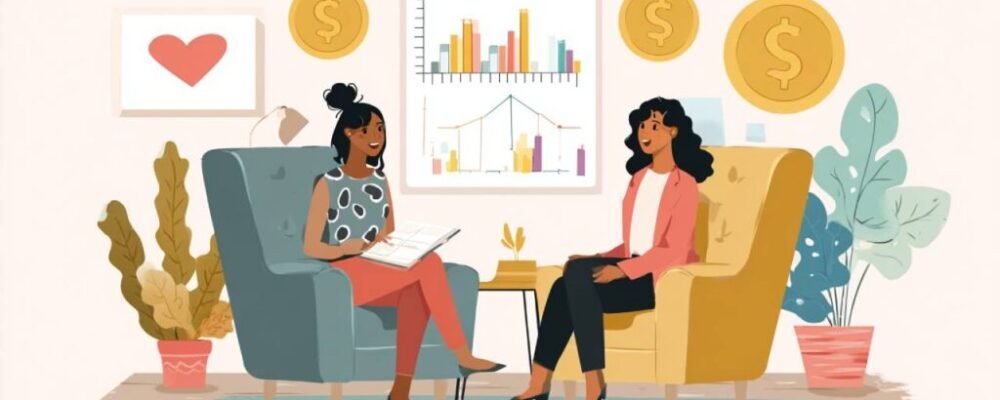Money Therapy: A New Path to Financial Peace
Money therapy isn’t just for the wealthy or financially reckless—it’s a practical and emotional tool for anyone who’s ever felt stressed, ashamed, or overwhelmed by money. In a world where financial anxiety affects nearly 7 out of 10 adults, our relationship with money has become more emotional than transactional. We don’t just spend or save—we fear, avoid, overcompensate, or spiral. That’s where money therapy comes in. Combining psychology with personal finance, it helps people unpack the emotional baggage behind their financial habits and rewrite the “money scripts” that silently drive their decisions. Whether you’re living paycheck to paycheck or earning six figures, healing your money mindset could be the most powerful investment you make.

💰 Chapter 1: Money Anxiety in the Modern Age
Why We All Need a Little Money Therapy
Financial stress is no longer a rare crisis—it’s a shared condition. Nearly 65% of adults admit they lose sleep over money, while others simply avoid checking their bank accounts altogether. We fear debt, shame spending, and stay silent about salary. This emotional turbulence isn’t irrational—it’s rooted in life experiences, childhood messages, and cultural taboos. That’s why more people are turning to money therapy, not as a luxury, but as a lifeline.
Watch this short clip that captures the everyday panic of money shame: YouTube Shorts – “Can’t check my bank balance”
In today’s fast-moving economy, the pressure to “have it all” is relentless. But truthfully? Wealth without peace of mind is useless. If you’ve ever avoided budgeting, argued with a partner over spending, or impulse-bought just to feel better, you’re not alone—and you might already be a candidate for money therapy.
🌐 Where This Stress Comes From
Much of our financial anxiety stems from outdated beliefs like:
-
“Talking about money is rude.”
-
“I’m just not good with money.”
-
“If I had more, I’d feel better.”
These unconscious scripts often sabotage our goals without us even realizing it. In this post, we’ll explore how to spot those beliefs and begin replacing them with wealth-building mindsets like the ones described in 10 Wealth Mindsets That Build Generational Riches.
Want to fast-track your emotional money healing? Explore the psychology-backed framework in our Financial Fulfillment & Stewardship Guide.
💸 What You Can Start Doing Today
Even before seeing a professional, you can begin the healing process. Here are three simple money therapy practices to start with:
-
Name your anxiety — Write down what exactly you’re afraid of (e.g., “I won’t be able to retire”).
-
Observe without judgment — Track spending for 7 days with curiosity, not shame.
-
Replace the script — Change “I’ll never get out of debt” to “I’m learning to make better choices.”
These are more than budgeting hacks—they’re emotional rewires.
To go deeper, this free resource Make Money Work for Your Life Goals will guide you from avoidance to alignment.
🎯 Your Next Step Toward Healing
Ready to start reshaping your relationship with money? This short training video offers real tips from certified coaches:
🔗 Watch on YouTube: Why You’re Addicted to Financial Chaos
And if you want to take it further, check out this popular step-by-step system for transforming your money mindset:
👉 Start your journey here (affiliate link)

🧠 Chapter 2: What Is Financial Therapy?
Understanding the Heart of Money Therapy
Money therapy is the bridge between your wallet and your well-being. It’s where financial planning meets emotional healing. Unlike traditional financial advice that focuses on numbers, money therapy focuses on you—your thoughts, behaviors, and feelings about money.
Certified financial therapists blend behavioral psychology with personal finance to help clients break toxic cycles, recover from past trauma, and build healthier money habits.
Think you need a financial therapist? Watch this quick guide:
🔗 YouTube: 5 Signs You Might Benefit from Financial Therapy
💡 Why Is Financial Therapy Different?
What makes money therapy unique is that it doesn’t just tell you what to do with your money—it uncovers why you do what you do.
Here’s how it differs from traditional money coaching:
| Traditional Finance | Financial Therapy |
|---|---|
| Budgeting & investing | Understanding your money story |
| Tracking debt | Healing financial trauma |
| Setting goals | Uncovering emotional triggers |
| Retirement planning | Redefining self-worth & security |
For example, if you constantly overspend when stressed or self-sabotage your savings goals, money therapy helps you identify the root belief driving that habit. You can learn more about belief-based decision patterns in our post on abundance mindset and escaping scarcity.
🧭 The Core Tools of Money Therapy
A typical financial therapy journey may include:
-
Money story journaling – understanding your earliest money memories
-
Body check-ins – learning how your body reacts to money stress
-
Spending tracking with meaning – categorizing by emotion, not just category
-
Script rewrites – flipping self-sabotaging thoughts to empowering beliefs
Curious what a session looks like? See this overview from an actual coach:
🔗 YouTube: Inside a Money Therapy Session
📘 Who Is It For?
Money therapy is for you if:
-
You avoid looking at your bank account
-
You argue about money in your relationships
-
You’ve experienced poverty, debt, or financial shame
-
You earn well but never feel secure
-
You want to feel in control, not controlled by money
Want to explore this further? Read about how Gen Z chooses joy over traditional saving—a mindset shift that’s deeply tied to emotional finance.
🛠️ Want to Start Now?
Here’s a free workbook that walks you through identifying your money triggers and building healthy scripts:
👉 Download “Build Real Wealth and Escape Scarcity”
And if you’re ready to go all-in, this highly-rated course can fast-track your healing:
🎯 Join Here – Affiliate Link

🌍 Chapter 3: Why Money Therapy Matters More Than Ever
The Silent Epidemic of Financial Stress
We’re living in a time where “busy” is glorified, burnout is common, and financial pressure feels like a constant undertone in everyday life. And while inflation, housing costs, and debt levels climb, emotional support for financial struggles hasn’t kept pace. Enter: money therapy—a crucial tool in today’s psychological and financial toolkit.
According to a recent study by the American Psychological Association, money remains the number one cause of stress for adults, above work, relationships, or health. And yet, very few of us are taught how to cope with money emotionally—not just mathematically.
Watch: How financial stress rewires your brain and habits
🎥 YouTube Shorts – “Why You Freeze When Facing Bills”
📊 Why Financial Planning Alone Isn’t Enough
Let’s be real: budgeting apps can’t solve guilt, and investment strategies won’t fix inherited money shame. Many high-earners still live paycheck to paycheck—not due to a lack of income, but because of subconscious behaviors driven by unresolved beliefs.
That’s exactly why money therapy is gaining momentum. It fills the emotional and behavioral gaps left behind by traditional finance tools. It helps people:
-
Unpack inherited trauma from growing up in poverty
-
Heal after financial abuse or toxic relationship dynamics
-
Create aligned financial goals rooted in self-worth, not fear
-
Communicate about money without defensiveness or secrecy
Need a reset? This post can guide you through 10 Wealth Mindsets That Build Generational Riches, even if you didn’t grow up rich.
🌱 A Cultural Shift in Wealth Thinking
Younger generations—especially Millennials and Gen Z—are leading a major shift in how we view wealth. Instead of chasing arbitrary financial milestones, they prioritize emotional peace, autonomy, and purpose-driven spending.
More people are asking:
“What’s the point of wealth if it destroys my mental health?”
That’s the essence of money therapy—rewiring the goal of money from accumulation to alignment.
Explore this further in our post: Wealth & Happiness: What Money Really Buys
Watch: Gen Z explains why mental clarity matters more than savings goals
🎥 YouTube Shorts – “Soft Saving: Choosing Joy Over Wealth”
🔗 Start Your Own Mindset Shift
You don’t have to be rich to feel rich. The key is learning to view money not just as a resource—but as a reflection of how you treat yourself.
💡 Read: Abundance Mindset – 5 Shifts That Unlock Wealth
Want a therapist’s roadmap to change your patterns? This affiliate course lays out a structured emotional finance reset:
🎯 Join the program here

🚨 Chapter 4: 5 Emotional Signs You Might Need Money Therapy
It’s Not Just About Numbers—It’s About What You Feel
Let’s face it: most people wait until they’re drowning in debt or stuck in financial chaos before seeking help. But money therapy isn’t just for rock bottom—it’s for anyone caught in emotional loops around money. The truth is, the red flags are often emotional, not mathematical.
If any of these signs sound familiar, your money habits might be running on unhealed emotional scripts.
1. 🧾 You Avoid Looking at Your Bank Account
Does opening your banking app make your chest tighten? Do you avoid checking your balance unless absolutely necessary?
This is classic financial avoidance—an anxiety pattern rooted in fear of judgment, failure, or loss of control. Money therapy helps you gently rebuild financial visibility without shame.
Watch: Why so many avoid finances like a toxic ex
🎥 YouTube Shorts – “Financial Avoidance Explained”
👉 Read more: Soft Saving – Why Gen Z Chooses Joy Over Saving
2. 💳 You Spend to Self-Soothe
Impulse buys. Retail therapy. DoorDash orders when you’re stressed.
Emotional spending is one of the most common signs that your money behavior is tied to unmet emotional needs—not logic.
Money therapy addresses what you’re really trying to soothe, helping you shift from reaction to intention.
💡 Learn to align spending with values: Make Money Work for Your Life Goals
3. 😔 You Feel Shame or Guilt Around Money
Whether it’s guilt from debt, shame about how you grew up, or embarrassment over your income—these feelings often lead to financial paralysis or secretive behavior.
Money therapy helps separate self-worth from net worth. It teaches you to reframe mistakes as data, not disasters.
🛠 Start healing: Download “Build Real Wealth and Escape Scarcity”
4. 🗣 You Fight About Money in Your Relationships
Money is the #1 cause of relationship stress and divorce—and most arguments aren’t about math, but meaning. When one partner sees spending as freedom and the other sees it as danger, conflict is inevitable.
Money therapy for couples is increasingly popular because it opens space for emotional clarity—not just compromise.
Watch: Couples explain how financial therapy saved their marriage
🎥 YouTube Shorts – “How We Stopped Fighting About Money”
5. 🔄 You Keep Repeating the Same Money Mistakes
Different job, same paycheck stress. More income, still no savings. New year, same debt cycle.
Sound familiar?
This is called money looping. It’s a behavioral pattern that can’t be fixed by new tools—it needs new beliefs. And that’s exactly what money therapy provides.
📘 Read: 10 Wealth Mindsets That Build Generational Riches
🎯 Your Next Move
Recognizing one or more of these signs is the first step. The next step is giving yourself permission to heal.
Ready for structured help? This emotional finance course was created by licensed coaches:
👉 Enroll here – affiliate link
Bonus: Check out this clip that breaks down the #1 belief that keeps people stuck financially:
🎥 YouTube Shorts – “Your Money Isn’t the Problem. Your Beliefs Are.”
🧩 Chapter 5: How Money Therapy Works – Step by Step
What to Expect When You Start Healing Your Financial Life
So you’ve realized something deeper is driving your money behavior. Now what?
That’s where money therapy shines—it offers not just insight, but a practical, guided process to transform how you think, feel, and act around money.
Whether working with a certified financial therapist or starting on your own, here’s how the journey typically unfolds.
🔍 Step 1: Identifying Your “Money Story”
We all have a personal money story—a collection of early experiences, family beliefs, and emotional patterns.
In therapy, you’ll explore:
-
First money memories (e.g. “money always caused fights”)
-
Family financial rules (spoken or unspoken)
-
Early messages like “you have to suffer to earn”
📝 Want to explore your story now? Download our free reflection guide:
👉 Abundance Mindset: 5 Shifts That Unlock Wealth
🧠 Step 2: Discovering Your “Money Scripts”
These are the subconscious beliefs that run your financial decisions on autopilot. Examples include:
-
“Money is evil”
-
“If I earn more, I’ll lose friends”
-
“I’m bad with numbers”
These internal scripts often override even the best financial plans—until they’re rewritten.
Watch: “How Your Money Beliefs Create Your Reality”
🎥 YouTube Shorts – Quick Belief Reframing
Explore more belief rewiring tools in: Make Money Work for Your Life Goals
💬 Step 3: Emotional Awareness & Body Check-Ins
Money decisions are rarely just mental—they’re physical. You might feel a stomach knot when opening bills or a rush of adrenaline during impulse buys.
Money therapy teaches you how to tune in:
-
Notice body sensations during money tasks
-
Identify “trigger” emotions (shame, fear, urgency)
-
Practice grounding before reacting
Tip: Try a daily 2-minute money mindfulness exercise. Breathe, reflect, write.
🧰 Step 4: Tools for Rebuilding New Habits
Once old scripts are uncovered, therapy helps you create a healthier framework for action.
Key tools include:
-
Journaling – track financial events and emotions
-
Affirmation rewriting – flip fear-based thoughts
-
Spending by values – align money with purpose, not pressure
-
Budgeting with emotions – not just categories, but clarity
Want to experience these shifts firsthand?
Check out this popular Emotional Wealth Rebuild Program – (affiliate link)
🔄 Step 5: Integration & Forward Planning
Money therapy isn’t about staying in the past—it’s about empowering the future.
You’ll develop:
-
Conflict-free ways to talk about money
-
Personalized spending frameworks
-
Repaired financial confidence
-
Clarity around wealth goals without burnout
💬 Related read: Financial Fulfillment & Stewardship Guide
🎥 Watch: A Real-Life Money Therapy Process
See what a full emotional-financial reset looks like in action:
🎬 YouTube – Step-by-Step Money Mindset Reset
🛤️ Start Your Own Healing Path
If this process resonates, consider this your invitation to begin. Whether you start with a journal, a worksheet, or a professional therapist—your financial peace is worth it.
🟢 Join this guided emotional finance reset program now →
👉 Click here to enroll (affiliate link)

🌟 Chapter 6: Real-Life Transformations Through Money Therapy
From Financial Chaos to Confidence — It’s Possible
Money therapy isn’t just theory—it works. People from all walks of life have used it to break generational cycles, heal financial trauma, and finally feel at peace with their money.
Below are real-life transformations (names changed) that show how shifting your mindset can change more than your bank balance—it can change your life.
🧕 Case 1: “Leila” — From Credit Card Panic to Financial Calm
Before:
Leila, a 32-year-old marketing manager, constantly racked up credit card debt. Every time she tried budgeting, she gave up halfway—saying she “just didn’t have the discipline.”
After Money Therapy:
Through money therapy, Leila discovered that her overspending was triggered by childhood scarcity. Shopping became her way to feel in control.
Tool that helped her most: spending with intention journaling + rewriting the belief “I never have enough.”
She now saves 20% of her income consistently and says for the first time, “I don’t feel attacked by my bank account.”
📝 Learn how to align your spending habits with purpose:
👉 Make Money Work for Your Life Goals
🧑🤝🧑 Case 2: “Jason & Mark” — From Money Fights to Financial Teamwork
Before:
Jason wanted to save aggressively for early retirement. Mark wanted to enjoy their income now. Every month ended in resentment and confusion.
After Money Therapy:
They learned that their money values were shaped by different upbringings—Jason grew up poor, Mark middle-class.
Money therapy gave them shared language, emotional tools, and a “hybrid” financial plan.
Watch how couples transform their conversations through therapy:
🎥 YouTube Shorts – “Financial Intimacy for Couples”
📘 Explore similar principles in: 10 Wealth Mindsets That Build Generational Riches
🧓 Case 3: “Ruth” — From Retired But Broke to Peaceful and Prepared
Before:
Ruth, 60, had retired but was quietly dipping into savings faster than planned. She felt shame and didn’t want to ask her children for advice or support.
After Money Therapy:
She learned her fear of “being a burden” was driving her to avoid financial planning altogether.
Money therapy helped her create a new budgeting rhythm and rebuild a supportive family dialogue around money.
💡 She now volunteers teaching financial literacy to single moms.
Inspired? Start with this emotional abundance reset:
👉 Download Free Guide
💬 Testimonials from the Community
“Money therapy helped me realize I wasn’t lazy—I was anxious.”
—Tina, Freelancer, 27
“I always thought if I earned more, I’d feel safe. I was wrong. What changed was how I related to money.”
—Carlos, Engineer, 35
“This process helped me talk to my kids about money without guilt for the first time.”
—Naomi, Single Mom, 43
📣 Want to join a supportive community of emotional finance learners?
👉 Join our email series – affiliate link
🌱 Begin Your Transformation
You don’t need to hit rock bottom to begin. You just need curiosity, courage, and the right tools.
Try this proven 7-day self-paced course to reset your beliefs, track behaviors, and build emotional clarity:
🎯 Start here – affiliate course
Watch: One man’s 90-day journey from money mess to financial alignment
🎥 YouTube – 90 Day Money Therapy Documentary
🧘 Chapter 7: Simple DIY Money Therapy Exercises
Start Healing Your Financial Mindset—Right Now, At Home
You don’t need a licensed financial therapist or a weekly appointment to begin. Money therapy starts with awareness—and a willingness to pause, reflect, and choose differently.
The following DIY exercises are simple, powerful tools that help you gently unpack the emotions behind your spending, saving, and earning patterns.
These are practices real people have used to transform financial anxiety into peace. Pick one and start today.
✍️ 1. The Money Memory Map
Purpose: Identify the origin of your financial beliefs.
How to do it:
-
Write down your earliest memory of money.
-
Ask: What emotions come up? Who was involved?
-
Identify the belief that may have formed.
Example: “We never had enough” → “I must hoard or I’ll suffer.”
📘 Connect this to long-term mindset growth:
👉 10 Wealth Mindsets That Build Generational Riches
💡 2. Rename Your Expenses
Purpose: Shift spending from guilt to intention.
Change your budgeting app or spreadsheet to emotionally aligned names. For example:
-
“Groceries” → “Nourishment”
-
“Rent” → “Safety & Space”
-
“Internet” → “Creative Access”
Why it works: It reframes spending as self-care and investment—not loss.
Inspired by this concept? Watch:
🎥 YouTube Shorts – “How to Emotionally Rewire Budgeting”
🧘♀️ 3. 2-Minute Body Check-In Before Spending
Purpose: Catch emotional spending triggers before they act.
Steps:
-
Close your eyes. Take 3 deep breaths.
-
Ask yourself: “What am I feeling right now?”
-
Rate emotional urgency from 1–10.
-
Proceed—or pause—based on emotional clarity.
This micro-ritual builds awareness between impulse and action.
Want to build a complete habit system around this?
🎯 Try This Self-Paced Mindset Reset – affiliate link
🧾 4. The “Money Scripts” Rewrite
Purpose: Turn disempowering beliefs into powerful scripts.
Step-by-step:
-
Write 3 negative money thoughts you often repeat.
E.g. “I’ll never catch up.” “I’m bad with money.” -
Flip each one with evidence-based reframing.
→ “I’m learning new ways to manage money with clarity.”
Repeat daily for 7 days. Bonus: Write them on sticky notes near your mirror.
📗 Get more mindset reframes here:
👉 Abundance Mindset – 5 Shifts That Unlock Wealth
📅 5. Weekly “Money Emotion Review”
Purpose: Track not just what you spend—but how you feel when you do.
Create a table like this in your journal:
| Date | What I Spent | Why I Spent | Emotion After |
|---|---|---|---|
| July 3 | $27 on takeout | Felt tired and lonely | Guilty but relieved |
Do this weekly to spot emotional trends. Most people are shocked by the clarity it brings.
🛠 Bundle: Want a Full DIY Toolkit?
We’ve collected 10 of our favorite money therapy tools, templates, and printable trackers in one emotional finance toolkit. You can access it here:
👉 Download the DIY Money Therapy Starter Pack – affiliate link
🎬 Bonus Video: Practice in Action
Watch how real people are applying emotional budgeting rituals in their daily lives:
🎥 YouTube Shorts – “Financial Rituals That Actually Work”
🧑⚕️ Chapter 8: When to Seek a Professional for Money Therapy
DIY Can Get You Far—But Not Everywhere
You’ve journaled. You’ve tracked emotions. You’ve rewritten your money scripts.
But if you still feel stuck, overwhelmed, or like you’re repeating the same patterns… it may be time to bring in a guide.
Money therapy is powerful as a self-practice, but when your financial struggles are deeply emotional or relational, a trained professional can help you break through faster—and more safely.
🚩 Signs You May Need Professional Help
You should strongly consider working with a certified financial therapist if:
-
You’ve experienced financial trauma, like bankruptcy, fraud, or abuse
-
You constantly feel guilt, shame, or fear around money, despite trying to improve
-
You and your partner are stuck in repetitive arguments about spending or saving
-
Your money beliefs are negatively affecting your health, work, or relationships
-
You feel you’ve hit a ceiling—even after reading, budgeting, and trying on your own
📘 Related: Financial Fulfillment & Stewardship Guide
Watch: Therapist explains what financial trauma really looks like
🎥 YouTube Shorts – “Emotional Red Flags in Your Finances”
🧑🏫 What a Money Therapist Actually Does
Financial therapists are trained to combine:
-
Psychotherapy tools (CBT, trauma-informed care, attachment theory)
-
Financial literacy (budgeting, investing, planning)
-
Behavioral coaching (habits, values, goal clarity)
Sessions may include:
-
Deep money story work
-
Real-time budgeting + emotion tracking
-
Couple communication frameworks
-
Emotional release work tied to earning or spending
💡 Find a certified practitioner:
Visit Financial Therapy Association (FTA) for CFT®-designated therapists.
🔍 How to Choose the Right Therapist for You
Ask the right questions:
-
Do they hold the CFT-I™ credential or relevant clinical license?
-
Do they integrate emotional and financial coaching?
-
Do they offer individual, couple, or family sessions?
-
Are sessions virtual or in-person?
Don’t just look for a planner. Look for someone who sees you—not just your balance sheet.
💬 Want a lighter, affordable starting point?
Try this digital mindset reset course →
👉 Join here – affiliate link
🧠 Not Ready for Therapy? Go Hybrid
You can combine guided self-work with digital support tools. Many people do this before seeing a therapist—or instead of one.
🎯 Try this 7-day self-guided program built by emotional finance educators:
👉 Enroll Now – affiliate course
📗 Read next: Abundance Mindset – 5 Shifts That Unlock Wealth
✨ Final Thought
You’re not weak for needing help—you’re wise.
Money affects everything. And when it’s tangled up with shame, fear, or inherited beliefs, it deserves the same care as any part of your mental health.
Seeking support for your financial mindset is an act of power, not defeat.
Watch: Why asking for help with money is brave, not broken
🎥 YouTube Shorts – “The Strength to Heal Financially”

🗺️ Chapter 9: Creating Your Personal Money Therapy Roadmap
From Awareness to Action—Build Emotional Wealth That Lasts
You’ve made it through the core of money therapy—from recognizing money anxiety to rewriting beliefs, building habits, and even deciding if you need professional help.
Now it’s time to put everything into motion with a personal roadmap: a sustainable, values-aligned plan for emotional and financial wellness.
🎯 Step 1: Define Your Emotional Money Goal
Forget “retire at 50” or “save $10K in 90 days”—start with emotional clarity.
Ask yourself:
-
What do I want to feel when I engage with money?
-
Peaceful? Confident? Empowered?
-
-
What triggers still throw me off emotionally?
-
What would “wealth” look like if it had nothing to do with numbers?
💬 Reflect on this using the prompt:
👉 What Money Really Buys – Wealth & Happiness Guide
🧩 Step 2: Choose Your Tools and Rituals
Money therapy isn’t about doing everything—it’s about doing what works for you. Pick 2–3 tools from Chapters 5 & 7 and commit for 21 days.
Examples:
-
Weekly “Money Emotion Review”
-
Daily 2-minute body check-in before purchases
-
Renaming expenses in your budgeting app
-
Journaling one limiting belief per night
🧘 Need a done-for-you toolkit?
👉 Get the Money Therapy Starter Pack – affiliate link
🔁 Step 3: Track Emotional Wins, Not Just Financial Ones
Don’t just track savings and debts—track emotional shifts:
-
“I had my first money conversation with my partner without tension.”
-
“I checked my balance this week without spiraling.”
-
“I said no to a purchase because it wasn’t aligned, not because I felt broke.”
Use a simple log like this:
| Date | Emotional Win | Feeling |
|---|---|---|
| July 3 | Skipped impulse buy after journaling | Calm, in control |
📘 Learn how to build wealth by building emotional stability:
👉 Financial Fulfillment & Stewardship Guide
🚧 Step 4: Know When to Pivot or Upgrade
As you grow, your needs change.
Some weeks you’ll fly solo. Others, you may want:
-
A peer group or accountability circle
-
A coach or therapist
-
A guided online course
Your financial emotions deserve attention just like your body or business.
🎯 Upgrade your process anytime with this guided mindset reset:
👉 Enroll in the Program – affiliate link
🛤️ Step 5: Keep Wealth Aligned with Purpose
Your final checkpoint: wealth is not just about having more—it’s about living in alignment with who you are.
Ask weekly:
-
Is my spending aligned with what I value?
-
Is my income model aligned with my energy and mission?
-
Is my definition of “enough” still mine—or someone else’s?
📗 Explore more: Make Money Work for Your Life Goals
💬 Final Words: You’re Already on the Path
You don’t need to “fix” yourself.
You just need to stay in conversation—with your money, your beliefs, and your body.
Money therapy is not a destination.
It’s a mindset. A movement. A way of reclaiming peace in a world obsessed with pressure.
Ready to take the next aligned step?
🎁 Download the full 9-Chapter Money Therapy Guide as a printable PDF: (link placeholder for future use)
📬 Stay Connected
Join our email list for weekly tools, healing prompts, and emotional finance support:
👉 Subscribe Now – affiliate link
Watch: “What Happens When You Finally Feel Safe with Money”
🎥 YouTube Shorts – Final Reflection
Please log in to access your exclusive content.
Don’t have an account? Click the “Register” button below to sign up.









